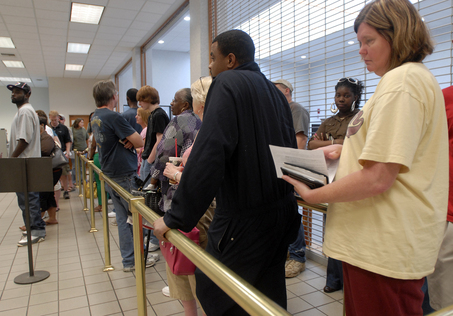Birmingham Cuts Services After Losing Tax Money

Penny Payton, far right, had waited more than 1½ hours at the Center Point satellite courthouse Friday to buy her car tag and still had more than 20 people in line in front of her. The office is one of the satellite courthouses the Jefferson County Commission is set to discuss closing to save money. (Jeff Roberts, Birmingham News)
A court decision striking down Jefferson County, Alabama’s commuter tax — combined with an impasse in the state legislature — has led to the shutdown of significant government services, Bloomberg reports.
Alabama’s most populous county is preparing to stop road maintenance, close courthouses and shutter services for the elderly after a court struck down taxes that pay for about 35 percent of its budget.
Jefferson County, which includes Birmingham, released a plan to cut $52 million from its budget as it appeals the ruling against its business and occupational taxes to the Alabama Supreme Court. Without that revenue, the county has said it is at risk of running out of money as soon as this month.
The loss of the tax money was another blow to a county that has been struggling to avoid bankruptcy since last year, when Wall Street’s financial crisis caused its interest bills to soar on more than $3 billion of bonds. The challenged taxes provided about $75 million in the fiscal year ended Sept. 30 to the county, which is forced to balance its budget under state law.
“I’m not expecting that this is going to go easy into the night, but I’m abiding by the law,” county Commission President Bettye Fine Collins, a Republican, told reporters in Birmingham. “People who thought this was some kind of game are finding out this reality.”
The proposed cuts, outlined in a series of proposed resolutions released today by Collins, would slash deeply into the government’s services and include closing a nursing home for the indigent, declaring a moratorium on enforcing zoning and littering laws, and scrapping local development contracts. They would also bring a halt to the enforcement of building codes, close the county’s laundry, and shut down the agency that assists senior citizens.
Rob Port notes the tendency of local officials faced with revenue to “immediately threaten to cut back on some of the things government does that the taxpayers value most” even though “there’s more than enough fat to be cut from government budgets without resorting to things like closing down firehouses.” That certainly happens. I can think of several occasions where Friday night football was threatened with cancelation when school boards were piqued at failed bond initiatives.
That doesn’t seem to be the case here, though. The Birmingham News account of the cuts notes, “The list does not include cuts to the sheriff’s office, Environmental Services Department or Cooper Green Mercy Hospital. County officials said they wanted to avoid eliminating essential services in the first round of cuts.” Further,
The budget reductions — which total $51,761,563 — range from closing all satellite courthouses at an estimated saving of $8.3 million to abolishing the county’s employee tuition reimbursement program at an estimated saving of $68,847. Many of the cost-saving measures have been discussed for months, since commissioners learned they might lose the occupational tax.
What we’ve got here is a county government that is simultaneously providing services that votes want but unable to raise taxes because voters don’t want to pay for them. They tried the common solution in these cases — extracting the taxes from people who can’t vote in the jurisdiction in question — and succeeded until a judge ruled that they had to quit. This of course exacerbates the original problem because, in the interim, people got used to even more services that were, in essence, free.






With out knowing more of what was cut and not cut, this looks like a reasonable set of cuts. Satellite courthouse are a convenience, not a necessity (assuming the central can take up the slack). Stopping local building contracts are also the sort of thing that makes sense (unless the penalties are greater than the completion cost). On the other hand, I would have expected something like a 10% across the board pay cut or the like if this was a company.
What you also had was a large population of freeloaders (working in Birmingham, using their services, paying nothing for it); then getting taxed by the county they worked in so they weren’t freeloading any more. But suburban freeloaders are the darlings of state legislators, so of course, that particular ‘user fee’ had to go.
I’d like some clarification on what exactly makes a “suburban freeloader”. I live in the suburbs but, I can’t for the life of me figure out what I’m using and not paying for. So can someone give some examples of things that one might be getting/using for free that the “city folk” are picking up the tab on?
I can’t for the life of me figure out what I’m using and not paying for.
Well, for starters, you are using police and fire protection and roads, sewers and other public infrastructure that is all paid for by someone else.
Think of the burden on your suburb if suddenly it was all reversed and about 400,000 residents of the city showed up in your community every morning. Think the traffic might be a problem?
M1EK and Pug,
You may want to reconsider the concept of “suburban freeloader”. Let us assume that what brings them in are work, services (doctors, restaurants, etc) and entertainment (theaters, parks, etc). What of these could the county not tax with increased sales tax, property tax on business, etc. Of course doing so would likely push those businesses out, but then you would get rid of your “freeloaders”.
As for traffic, if the traffic is going to a destination, tax the destination. If the traffic is passing through, perhaps the state is a better source of help on taxes for the infrastructure.
The bottom line is that cities have a geographic economic advantage in centralization, but aren’t entitled to whatever level of tax revenues they want because of that. They need to make themselves attractive and balance the advantages they have with the taxes they impose. And worse, they have to learn to live within the reality of their worth, not their own self image.
Well for one my house is on septic so no one takes care of my sewer stuff. I pay for trash pick up and I pay the county for water. There are extra sales taxes that go to our roads and we pay state income taxes/local taxes and property taxes plus tolls on some roads. People living in the city are paying extra? Where’s it coming from? I live in a burb of Atlanta but my husband doesn’t work in Atlanta, he works in another burb and I don’t work so we rarely go into the “city”. In fact I avoid it at all costs. I have no idea which batch of taxes the police and fire rescue people are paid out of but I really doubt I’m getting it for free.
I honestly would really hate to find out that someone else is “supporting” me because I go out of my way to be as self sufficient as possible.
Maybe the issue is more, if you live in a burb and work in the city.
James, did you just equate Friday Night football with essential services? Are you from Alabama or something?
Well, for starters, you are using police and fire protection and roads, sewers and other public infrastructure that is all paid for by someone else.
Cities aren’t getting money from the commuters here, but they are (or should be) getting money from the employer that is bringing them in. If the people coming in the city to work is just too much, they need to talk to the companies bringing them in.
Heh. No, it’s an example of a visible, popular program that I’ve seen threatened cut in order to hold people up for taxes.
As noted above, I don’t think that’s what’s happening in this particular case. They built a budget around a certain kind of taxes and had those pulled out from under them mid-year.
I don’t know how it works in Alabama, but here in Jefferson Parish, a suburb of New Orleans, part of our parish (county) taxes are paid to Orleans Parish for services like park maintenance and stuff. The idea being that suburban people who use city services help pay for them. I don’t think it applies to police or fire protection, but I don’t know one way or the other.